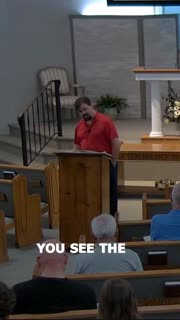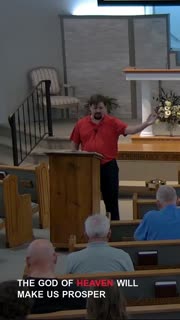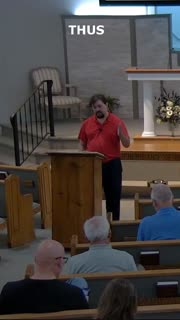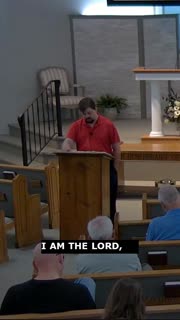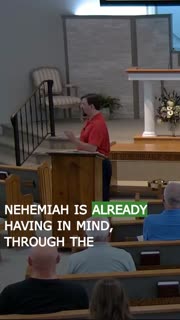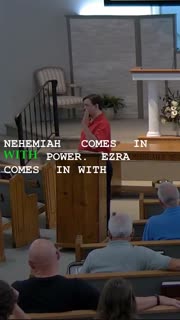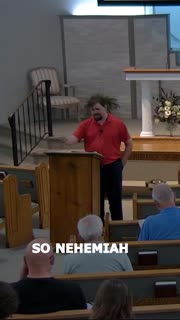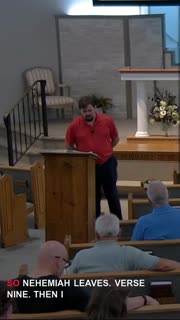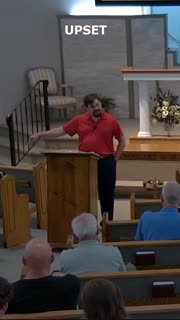Nehemiah: Faith, Courage, and Divine Purpose
Devotional
Sermon Summary
Bible Study Guide
Sermon Clips
### Quotes for Outreach
1. "You see the trouble we are in, how Jerusalem lies in ruins with its gates burned. Come, let us build the wall of Jerusalem that we may no longer suffer derision. And I told them of the hand of my God that had been upon me for good. Also the words of the king had spoken to me and they said, let us rise up and build. So they strengthened their hands for the good work." [39:00] (21 seconds)
2. "The God of heaven will make us prosper and we his servants will arise and build. But you have no portion or right or claim in Jerusalem." [40:16] (11 seconds)
3. "Thus says the Lord, your Redeemer, who formed you from the womb, I am the Lord who made all things. Who alone stretched out the heavens, who spread out the earth by myself, who who frustrates the signs of liars, who makes fools of diviners, who turns wise men back and makes their knowledge foolish, who confirms the word of the servant and fulfills the counsel of his messengers." [52:11] (23 seconds)
4. "I am the Lord, there is no other. Besides me there is no God. I equip you, though you do not know me. That people may know from the rising of the sun and from the west that there is none besides me. I am the Lord, there is no other." [53:27] (17 seconds)
### Quotes for Members
1. "Nehemiah is already having in mind, through the writing, these guys are going to be doing a lot of work, and they don't even know it yet. It's like when mom wakes up. The kids, don't even know what's coming. But mom does. Mom's come to Jerusalem." [38:59] (16 seconds)
2. "Nehemiah comes in with power. Ezra comes in with zeal, but he's very passive. Other people around him wind up making the decisions and he probably influences it, but they are the ones saying. Nehemiah doesn't wait for that. I mean, once you pull out somebody's beard, hair, you have a reputation." [36:06] (19 seconds)
3. "So Nehemiah comes to Jerusalem in verse 11, and when he gets there, he's there for three days, and he tells nobody what he's going to do, which I am. And I imagine caused a lot of fear and terror and wondering, and probably on every news network, they were wondering about what is his motivation and why is he here with a bunch of troops and all these official letters." [38:59] (25 seconds)
4. "So Nehemiah leaves. Verse nine. Then I came to the governors of the province beyond the river and gave them the king's letters. Now the king had sent with me officers of the army and horsemen. But when Sanballat the Horonite and Tobiah the Ammonite servant heard this, it displeased them greatly that someone had come to seek the well. Fair of the people of Israel." [34:08] (21 seconds)
5. "So Nehemiah is upset and he says it's because of what's going on at home, he just says, what do you want? What are you requesting of me? What are you asking of me? Because this is the laws of the Medes and the Persians. You can't just change things once the king has made a decree." [18:08] (14 seconds)
Ask a question about this sermon
1. "You see the trouble we are in, how Jerusalem lies in ruins with its gates burned. Come, let us build the wall of Jerusalem that we may no longer suffer derision. And I told them of the hand of my God that had been upon me for good. Also the words of the king had spoken to me and they said, let us rise up and build. So they strengthened their hands for the good work." [39:00] (21 seconds)
2. "The God of heaven will make us prosper and we his servants will arise and build. But you have no portion or right or claim in Jerusalem." [40:16] (11 seconds)
3. "Thus says the Lord, your Redeemer, who formed you from the womb, I am the Lord who made all things. Who alone stretched out the heavens, who spread out the earth by myself, who who frustrates the signs of liars, who makes fools of diviners, who turns wise men back and makes their knowledge foolish, who confirms the word of the servant and fulfills the counsel of his messengers." [52:11] (23 seconds)
4. "I am the Lord, there is no other. Besides me there is no God. I equip you, though you do not know me. That people may know from the rising of the sun and from the west that there is none besides me. I am the Lord, there is no other." [53:27] (17 seconds)
### Quotes for Members
1. "Nehemiah is already having in mind, through the writing, these guys are going to be doing a lot of work, and they don't even know it yet. It's like when mom wakes up. The kids, don't even know what's coming. But mom does. Mom's come to Jerusalem." [38:59] (16 seconds)
2. "Nehemiah comes in with power. Ezra comes in with zeal, but he's very passive. Other people around him wind up making the decisions and he probably influences it, but they are the ones saying. Nehemiah doesn't wait for that. I mean, once you pull out somebody's beard, hair, you have a reputation." [36:06] (19 seconds)
3. "So Nehemiah comes to Jerusalem in verse 11, and when he gets there, he's there for three days, and he tells nobody what he's going to do, which I am. And I imagine caused a lot of fear and terror and wondering, and probably on every news network, they were wondering about what is his motivation and why is he here with a bunch of troops and all these official letters." [38:59] (25 seconds)
4. "So Nehemiah leaves. Verse nine. Then I came to the governors of the province beyond the river and gave them the king's letters. Now the king had sent with me officers of the army and horsemen. But when Sanballat the Horonite and Tobiah the Ammonite servant heard this, it displeased them greatly that someone had come to seek the well. Fair of the people of Israel." [34:08] (21 seconds)
5. "So Nehemiah is upset and he says it's because of what's going on at home, he just says, what do you want? What are you requesting of me? What are you asking of me? Because this is the laws of the Medes and the Persians. You can't just change things once the king has made a decree." [18:08] (14 seconds)
